|
A concept proposal for station replications as a theme
for heritage and tourism
A Study in Railway
Station Architecture
in Central Alberta
(revised June 2022)
Photo descriptions
and credits at bottom of page.
The replication of several regional railway
stations forms a unique part of the concept plan for a community
heritage rail park in the Red Deer area.

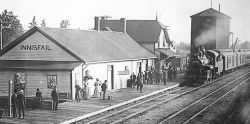 Although many railway stations have been
preserved and a handful have been replicated across Western Canada,
there is nowhere in North America that several railway stations have
been replicated on one site to demonstrate the variations in
architecture. The railway station was once the dominant structure in
communities, large and small, as the community hub and gateway to
the outside world. Other railway structures including grain
elevators also dominated the skylines of hundreds of communities. Although many railway stations have been
preserved and a handful have been replicated across Western Canada,
there is nowhere in North America that several railway stations have
been replicated on one site to demonstrate the variations in
architecture. The railway station was once the dominant structure in
communities, large and small, as the community hub and gateway to
the outside world. Other railway structures including grain
elevators also dominated the skylines of hundreds of communities.
 The proposed rail park
is envisioned to feature stations that serve as historic
representations of the variety that once existed in Central Alberta
(25 styles have been identified). These replications would be built
to current standards but would maintain their visual architectural
identity and house a number of interpretive centres focusing on the railways that built the region. The proposed rail park
is envisioned to feature stations that serve as historic
representations of the variety that once existed in Central Alberta
(25 styles have been identified). These replications would be built
to current standards but would maintain their visual architectural
identity and house a number of interpretive centres focusing on the railways that built the region.
The park
will also feature a variety of gardens including a railway
station park similar to one that was once located in downtown Red Deer and
several stations across Western Canada.
Representative stations would include educational exhibits
and programs and may have some specialty uses such as meeting and
activity rooms, work shops, a gift shop, refreshments,
administration and community facilities.
Stations of the Calgary and Edmonton Railway
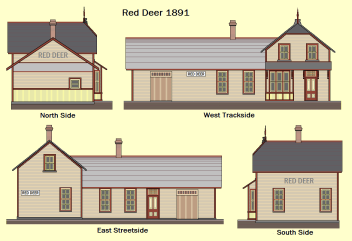 A replication of the
original 1891 Red Deer CPR wood combination station and freight house
is expected to be the first to be built in order to house our
collection of CPR artifacts gifted to the society by the Junior
League of Edmonton now housed at the Innisfail Historical Village. Ten of these virtually identical stations were
built during the summer of 1891 at approximately 18 mile intervals
between Calgary and Edmonton (Airdrie, Carstairs, Olds, Innisfail,
Red Deer, Lacombe, Ponoka, Wetaskiwin, Leduc, Strathcona). A handful
of similar stations were also built south of Calgary. A replication of the
original 1891 Red Deer CPR wood combination station and freight house
is expected to be the first to be built in order to house our
collection of CPR artifacts gifted to the society by the Junior
League of Edmonton now housed at the Innisfail Historical Village. Ten of these virtually identical stations were
built during the summer of 1891 at approximately 18 mile intervals
between Calgary and Edmonton (Airdrie, Carstairs, Olds, Innisfail,
Red Deer, Lacombe, Ponoka, Wetaskiwin, Leduc, Strathcona). A handful
of similar stations were also built south of Calgary.
See:
Plan for the Re-Creation of the C&ER Museum
Most of these stations were replaced by larger and newer structures
but some remained in service until the 1960s. Several were modified
as needs and functions evolved with relocated windows, doors,
chimneys. Some had additions for freight, express and living
quarters. None have been preserved.
It is anticipated that the Innisfail version that had been modified
by the end of the 1890s will be replicated for use as a C&E Railway
research and archive facility as well as a meeting room.
When the Red Deer station was replaced in 1910, it was relocated,
expanded and used as a freight house. A replication of this
structure could house a portion of a historical miniature world
model rail exhibit as well as function as a workshop for additional
miniature world exhibits.
Stations of the Canadian Pacific Railway
along the C&E
The Calgary & Edmonton Railway was operated by the
Canadian Pacific Railway and was eventually absorbed into the CPR
system. It was one of the most profitable railways in Canada. The
CPR replaced several of the C&E combination stations with larger
structures, most notably at Red Deer, Strathcona, Lacombe and
Wetaskiwin.
 The CPR also added intermediate stations along the
Calgary-Edmonton. Early standard #2 stations were built at Penhold,
Bowden, Blackfalds and Crossfield in 1904. The Bowden station has been
preserved at the Innisfail Historical Village and a later Std. #2
station was replicated at Penhold for commercial use. The Crossfield
station was destroyed by fire in 1933 and replaced with a standard
#4A station. The CPR also added intermediate stations along the
Calgary-Edmonton. Early standard #2 stations were built at Penhold,
Bowden, Blackfalds and Crossfield in 1904. The Bowden station has been
preserved at the Innisfail Historical Village and a later Std. #2
station was replicated at Penhold for commercial use. The Crossfield
station was destroyed by fire in 1933 and replaced with a standard
#4A station.
It is anticipated that the Penhold version will be replicated in the
rail park for a historical miniature world model rail exhibit.
An unusual 'Pratt' station was built at Didsbury in 1904. It has been
donated to the town, preserved and designated a historic resource. A
standard #5 station was built at Millet in 1907.
 The stations at Red Deer and Strathcona were replaced with grand
'chateau-style' stations in 1908 and 1910 respectively. Similar
stations were also built at Lethbridge, Medicine Hat and Saskatoon.
All 5 have been preserved and are designated historic resources. It
is anticipated that eventually, the original version of the Red Deer
station will be replicated as a visitor centre. The stations at Red Deer and Strathcona were replaced with grand
'chateau-style' stations in 1908 and 1910 respectively. Similar
stations were also built at Lethbridge, Medicine Hat and Saskatoon.
All 5 have been preserved and are designated historic resources. It
is anticipated that eventually, the original version of the Red Deer
station will be replicated as a visitor centre.
The Wetaskiwin and Lacombe stations were replaced by unusual
woodframe specialty stations in 1907 and 1911 respectively. The old
C&E stations were relocated and used as freight houses. The 'new'
Wetaskiwin station still stands empty and the 'new' Lacombe station was
demolished but was replicated for commercial use. The Leduc
combination station was replaced by a standard A2 Western station in
1914 and has since been demolished.
CPR Branchline Stations east of the C&E
Part of the Calgary & Edmonton Railway charter was the addition of
branchlines east of Lacombe and Wetaskiwin, each of which extended
into Saskatchewan.

Many stations were erected including standard #10 stations at Stettler
in 1905 and Camrose in 1907 and the smaller version #5 station at
Alix (similar to Millet) in 1910. It is anticipated that eventually
the Alix version will be replicated in the railpark.

Standard A2 Western stations similar to the
one built in Leduc were constructed at Clive, Nevis and Erskine
between 1910 and 1912. This style of station was also built at
Consort and Bittern Lake in 1911 and one was relocated to Castor in
1937. A Branchline Depot was built at Coronation. The Nevis station may be one of the stations
erected in the rail park.
CPR Stations of the Alberta Central
Railway
The Alberta Central Railway had great aspirations of being a
semi-continental railway stretching from Vancouver to Churchill,
Manitoba with its headquarters in Red Deer. The railway built two
significant bridges, one southwest of Red Deer at Mintlaw and the
other at Rocky Mountain House as well as a station and yard in the
Mountview area of Red Deer. The station was never used for its
intended purpose but has survived as a residence.
The railway went bankrupt and was taken over by the Canadian Pacific
Railway. The CPR was only interested in the portion between Red Deer
and Rocky Mountain House. The link between the two rail lines was at
Forth Junction near the present-day intersection of Taylor Drive and
32 St.

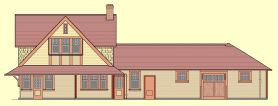 A number of temporary portable stations were erected at several
communities along the line. The CPR built standard #A3 station at
Rocky Mountain House (Lochearn) in 1920 and standard #14A stations at
Sylvan Lake in 1924 and Benalto in 1928. The society intends to replicate both
the Rocky and Sylvan Lake stations. The Benalto station has been preserved close to its
original location after having been relocated several times. A number of temporary portable stations were erected at several
communities along the line. The CPR built standard #A3 station at
Rocky Mountain House (Lochearn) in 1920 and standard #14A stations at
Sylvan Lake in 1924 and Benalto in 1928. The society intends to replicate both
the Rocky and Sylvan Lake stations. The Benalto station has been preserved close to its
original location after having been relocated several times.
Stations of the Canadian Northern Western Railway and CNR
A subsidiary of the Canadian Northern Railway, the Canadian Northern
Western Railway was a line built from Stettler to Nordegg between
1911 and 1912. The section from Stettler to Alix and the section
from Rocky Mountain House to Nordegg have been abandoned. The
remainder currently forms the Brazeau subdivision of the Canadian
National Railway.

Canadian Northern third class plan 29 stations were built at Nevis, Alix, Haynes,
Prentiss, Sylvan Lake, Eckville, Elspeth and Leslieville in 1912-13.
A third class plan 75 station was built at Nordegg in 1914. Several
other stations of this class were built throughout Central Alberta.
Some had extended freight sheds.
It is
anticipated that the Sylvan Lake station will be replicated in the
proposed rail park.
Small freight and passenger shelters were built at Joffre, Burbank
and Briggs.
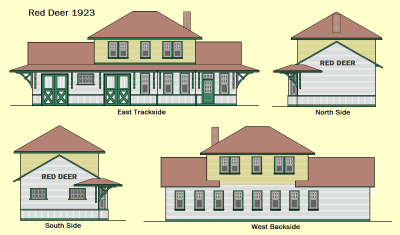
A fairly
unique
CNR special station was built at Red Deer in 1923 where the
present-day Co-op Shopping Centre downtown is located. It was
originally connected to the Canadian Northern Western Railway (CNR) over a bridge across
the Red Deer River but after several washouts was connected via the
CPR line to North Junction. The station was closed and demolished in
1960 and a new station and yard built on the north side of the
river.
It is anticipated that this station will be replicated in the rail
park for administration and special events.
Stations of the
Grand Trunk Pacific Railway
 The
Grand Trunk Pacific Railway built their Edmonton to Calgary line in
1911-12 through Camrose, Mirror and Three Hills. A special 'E'
station was built at Mirror. Regular Type E stations were built at
Bashaw, Alix, Ardley, Delburne, Elnora, Huxley, Trochu and Three
Hills. The Delburne station has been moved and restored to become
the Anthony Henday Museum. The Ardley station has been used as a
farm building since 1967. The Three Hills station was replaced by a
Type F station in 1919. The
Grand Trunk Pacific Railway built their Edmonton to Calgary line in
1911-12 through Camrose, Mirror and Three Hills. A special 'E'
station was built at Mirror. Regular Type E stations were built at
Bashaw, Alix, Ardley, Delburne, Elnora, Huxley, Trochu and Three
Hills. The Delburne station has been moved and restored to become
the Anthony Henday Museum. The Ardley station has been used as a
farm building since 1967. The Three Hills station was replaced by a
Type F station in 1919.
It is intended that this style will be represented in the rail park
by the Elnora station.
Other Stations
in Central Alberta
The Canadian Northern Railway built their Edmonton to Calgary line
through Camrose, Stettler and Big Valley in 1911. Large 2nd class
stations were built at Stettler and Big Valley and both have been
preserved. Much of the line was purchased and operated by the
Central Western Railway in 1986. Alberta Prairie Railway has
operated a tourist train since 1998 between Stettler and Big Valley.
3rd class stations have been preserved at Camrose, Meeting Creek and
Rowley.
The Lacombe and Blindman Valley Electric Railway, later renamed the
Lacombe and Northwestern Railway, was eventually purchased by
Canadian Pacific. A small station was built at Gull Lake/Aspen
Beach in 1917 and has survived. A standard #14 station similar to
Sylvan Lake and Benalto was built at Bentley in 1929. A similar
station was built at Torrington on the Acme subdivision in 1930.
The Forth Junction Project's ultimate vision is that a
semi-commercial railway station resort with additional station
replications for accommodation operated by a private
business in close proximity to the Forth Junction Heritage Rail Park.
Photo descriptions and credits:
Header: Red Deer
CPR 1910 station, park and C&ER 1891 combination station as freight house
1912
(colourized - Red Deer Archives P8737);
Rendering collage of multiple Central Alberta railway stations (Paul
Pettypiece);
Innisfail Calgary & Edmonton Railway 1891 station 1890s (Glenbow
Archives NA-1709-71 via Red Deer Archives);
Red Deer
CPR 1910 station, park and C&ER 1891 combination station as freight house
1912
(colourized - Red Deer Archives P8737);
Rendering of Red Deer C&ER 1891 combination station (Paul Pettypiece);
Rendering of Penhold CPR early standard #2 station 1968 (Paul
Pettypiece);
Rendering of Red Deer 1910 CPR brick chateau-style station prior to
expansion (Paul Pettypiece);
Rendering of CPR standard #5 stations similar to Alix and Millet
(Paul Pettypiece);
Rendering of CPR standard A2 Western station similar to Nevis and
Leduc (Paul Pettypiece);
Rendering of Rocky Mountain House/Lochearn CPR standard A3 station
(Paul Pettypiece);
Rendering of CPR standard #14A station similar to Benalto and Sylvan
Lake (Paul Pettypiece);
Rendering of Canadian Northern Third Class station with small
freight shed similar to Sylvan Lake, Haynes,
Prentiss, Alix, Eckville, Elspeth, Nordegg and others in
region (Paul Pettypiece);
Rendering of Red Deer 1923 Canadian National downtown station (Paul
Pettypiece);
Rendering of Grand Trunk type E station similar to Elnora, Ardley,
Delburne, Alix and Huxley (Paul Pettypiece)
Note: All renderings are the intellectual property of Paul
Pettypiece and may only be used for personal or historical use.
|

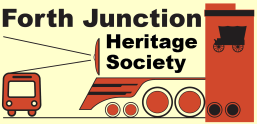

 Although many railway stations have been
preserved and a handful have been replicated across Western Canada,
there is nowhere in North America that several railway stations have
been replicated on one site to demonstrate the variations in
architecture. The railway station was once the dominant structure in
communities, large and small, as the community hub and gateway to
the outside world. Other railway structures including grain
elevators also dominated the skylines of hundreds of communities.
Although many railway stations have been
preserved and a handful have been replicated across Western Canada,
there is nowhere in North America that several railway stations have
been replicated on one site to demonstrate the variations in
architecture. The railway station was once the dominant structure in
communities, large and small, as the community hub and gateway to
the outside world. Other railway structures including grain
elevators also dominated the skylines of hundreds of communities. The proposed rail park
is envisioned to feature stations that serve as historic
representations of the variety that once existed in Central Alberta
(25 styles have been identified). These replications would be built
to current standards but would maintain their visual architectural
identity and house a number of interpretive centres focusing on the railways that built the region.
The proposed rail park
is envisioned to feature stations that serve as historic
representations of the variety that once existed in Central Alberta
(25 styles have been identified). These replications would be built
to current standards but would maintain their visual architectural
identity and house a number of interpretive centres focusing on the railways that built the region.
 A replication of the
original 1891 Red Deer CPR wood combination station and freight house
is expected to be the first to be built in order to house our
collection of CPR artifacts gifted to the society by the Junior
League of Edmonton now housed at the Innisfail Historical Village. Ten of these virtually identical stations were
built during the summer of 1891 at approximately 18 mile intervals
between Calgary and Edmonton (Airdrie, Carstairs, Olds, Innisfail,
Red Deer, Lacombe, Ponoka, Wetaskiwin, Leduc, Strathcona). A handful
of similar stations were also built south of Calgary.
A replication of the
original 1891 Red Deer CPR wood combination station and freight house
is expected to be the first to be built in order to house our
collection of CPR artifacts gifted to the society by the Junior
League of Edmonton now housed at the Innisfail Historical Village. Ten of these virtually identical stations were
built during the summer of 1891 at approximately 18 mile intervals
between Calgary and Edmonton (Airdrie, Carstairs, Olds, Innisfail,
Red Deer, Lacombe, Ponoka, Wetaskiwin, Leduc, Strathcona). A handful
of similar stations were also built south of Calgary.  The CPR also added intermediate stations along the
Calgary-Edmonton. Early standard #2 stations were built at Penhold,
Bowden, Blackfalds and Crossfield in 1904. The Bowden station has been
preserved at the Innisfail Historical Village and a later Std. #2
station was replicated at Penhold for commercial use. The Crossfield
station was destroyed by fire in 1933 and replaced with a standard
#4A station.
The CPR also added intermediate stations along the
Calgary-Edmonton. Early standard #2 stations were built at Penhold,
Bowden, Blackfalds and Crossfield in 1904. The Bowden station has been
preserved at the Innisfail Historical Village and a later Std. #2
station was replicated at Penhold for commercial use. The Crossfield
station was destroyed by fire in 1933 and replaced with a standard
#4A station. The stations at Red Deer and Strathcona were replaced with grand
'chateau-style' stations in 1908 and 1910 respectively. Similar
stations were also built at Lethbridge, Medicine Hat and Saskatoon.
All 5 have been preserved and are designated historic resources. It
is anticipated that eventually, the original version of the Red Deer
station will be replicated as a visitor centre.
The stations at Red Deer and Strathcona were replaced with grand
'chateau-style' stations in 1908 and 1910 respectively. Similar
stations were also built at Lethbridge, Medicine Hat and Saskatoon.
All 5 have been preserved and are designated historic resources. It
is anticipated that eventually, the original version of the Red Deer
station will be replicated as a visitor centre.


 A number of temporary portable stations were erected at several
communities along the line. The CPR built standard #A3 station at
Rocky Mountain House (Lochearn) in 1920 and standard #14A stations at
Sylvan Lake in 1924 and Benalto in 1928. The society intends to replicate both
the Rocky and Sylvan Lake stations. The Benalto station has been preserved close to its
original location after having been relocated several times.
A number of temporary portable stations were erected at several
communities along the line. The CPR built standard #A3 station at
Rocky Mountain House (Lochearn) in 1920 and standard #14A stations at
Sylvan Lake in 1924 and Benalto in 1928. The society intends to replicate both
the Rocky and Sylvan Lake stations. The Benalto station has been preserved close to its
original location after having been relocated several times.

 The
Grand Trunk Pacific Railway built their Edmonton to Calgary line in
1911-12 through Camrose, Mirror and Three Hills. A special 'E'
station was built at Mirror. Regular Type E stations were built at
Bashaw, Alix, Ardley, Delburne, Elnora, Huxley, Trochu and Three
Hills. The Delburne station has been moved and restored to become
the Anthony Henday Museum. The Ardley station has been used as a
farm building since 1967. The Three Hills station was replaced by a
Type F station in 1919.
The
Grand Trunk Pacific Railway built their Edmonton to Calgary line in
1911-12 through Camrose, Mirror and Three Hills. A special 'E'
station was built at Mirror. Regular Type E stations were built at
Bashaw, Alix, Ardley, Delburne, Elnora, Huxley, Trochu and Three
Hills. The Delburne station has been moved and restored to become
the Anthony Henday Museum. The Ardley station has been used as a
farm building since 1967. The Three Hills station was replaced by a
Type F station in 1919.